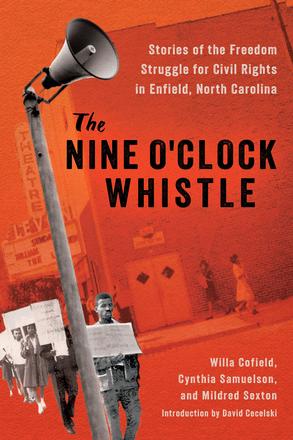
The Nine O'Clock Whistle
Stories of the Freedom Struggle for Civil Rights in Enfield, North Carolina
The untold history of a small town where a stand for civil rights had lasting, wide impacts
Description
Between the years of 1963 and 1965, civil rights protests rocked rural communities like Enfield, a small North Carolina town where segregationist and white supremacist attitudes prevailed. Whites in Enfield enforced a variety of racist norms and employed a range of racist practices, including the sounding of a siren on Saturday nights meant to order Black residents to leave the downtown streets at nine o’clock. On August 28, 1963, hundreds of people, including Willa Cofield—an English teacher in the Black, segregated high school—and two of her students, Cynthia Samuelson and Mildred Sexton, protested these conditions as masses of Black people ignored the whistle.
After firemen used high-powered water hoses to drive people off the streets, the Black community continued to resist by organizing a successful three-month boycott of the white-owned downtown stores. The movement quickly spread into the surrounding county, morphing into a voter registration campaign, a school integration effort, and a legal battle over author Willa Cofield’s First Amendment rights, after she was fired from her position as a public school teacher.
The Nine O’Clock Whistle covers a range of historically and contextually significant stories, including details from Cofield’s grandfather’s early life as an enslaved person and her family’s rise to prominence in the Enfield Black community, to the roles the authors played in the local protest movement during the 1960s. Ultimately, Cofield, Samuelson, and Sexton squarely repudiate the assertion that the civil rights movement bypassed communities in northeastern North Carolina, and prove instead that the movement drastically changed the lives of people in towns like Enfield forever.